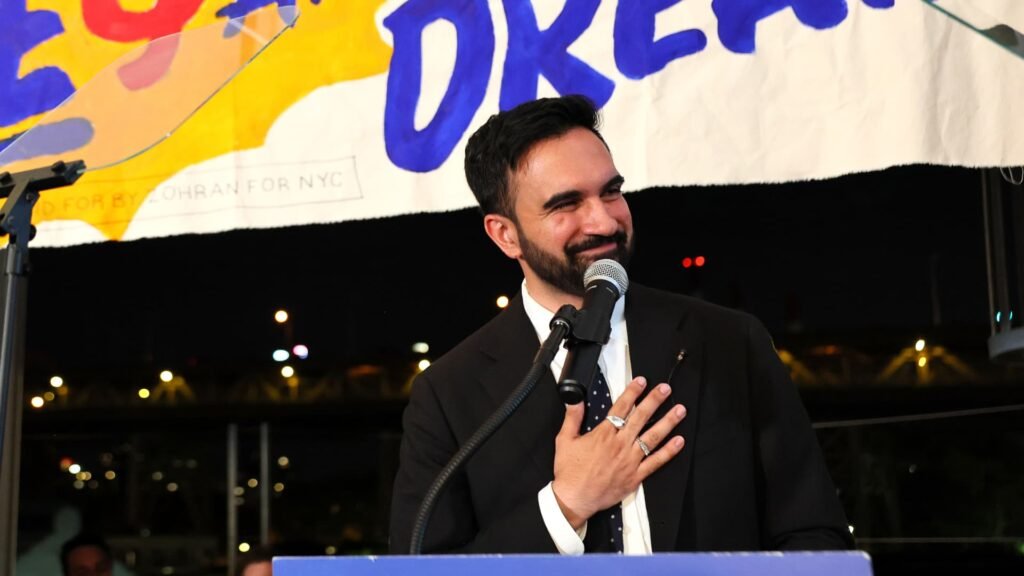It’s an understatement to say that Zohran Mamdani isn’t well-liked on Wall Street.
High-profile investors and business leaders in New York City are quite upset about the surprising primary victory of the democratic socialist, who is now in line to potentially become the next mayor. If elected in the upcoming general election, Mamdani’s leadership could introduce the very things Wall Street despises—higher taxes and stricter regulations that could threaten corporate and investment interests.
Philippe Laffont, the founder of the hedge fund Coatue Management, commented on CNBC that a Mamdani victory could spark another exodus of affluent investors. Since the pandemic began, many wealthy individuals and firms have left New York City for states with lower taxes like Florida and Texas.
“Some people are definitely going to leave,” Laffont said during an episode of CNBC’s “Squawk Box” on Wednesday following former Governor Andrew Cuomo’s concession of the Democratic nomination. “It’s not entirely settled yet. There’s still the general election. Cuomo might come back as an independent.”
Mamdani’s focus on socialism and wealth redistribution stands in stark contrast to Wall Street’s favoring of unregulated capitalism and pro-growth policies like low taxation. At just 33, he has backed measures such as taxing the ultra-wealthy, financial transactions, and passive incomes like dividends, in addition to advocating for a state wealth tax and higher income tax rates for top earners.
Hedge fund executive Bill Ackman expressed his disappointment on Wednesday with Mamdani’s victory, saying he woke up feeling “a bit depressed.” The Pershing Square chief is now considering the possibility of another candidate, not himself, running for office.
Lawrence Summers, the former Treasury Secretary and Harvard University president, also expressed his alarm about Mamdani’s nomination.
“I am deeply concerned for the future of the [Democratic National Committee] and the country because of Tuesday’s selection of a candidate who didn’t reject a slogan promoting globalizing the intifada and endorsed Trotskyite economic policies,” Summers shared on X.
‘Suicide by Mayor’
Some parts of the stock market are already reacting negatively to the possibility of a Mamdani-led New York City. Shares of Flagstar, a regional bank with ties to the New York real estate market, dropped nearly 4% on Wednesday. Other real estate stocks focused on office spaces also fell, with SL Green Realty down over 6% and Vornado Realty Trust nearly 7% lower.
Mamdani supports universal rent control, a move that would grant the mayor the authority to appoint members to the regulatory board overseeing rent-controlled and rent-stabilized apartments. This could hinder profits for multi-family rental properties by putting a halt to rent hikes.
In New York City, about one million apartments are rent stabilized, while only approximately 20,000 remain rent controlled.
“It seems like NYC is headed toward self-destruction by mayor,” Jim Bianco, president and macro strategist at Bianco Research, remarked on X Tuesday night.
‘Terror is the feeling’
Mamdani’s preferred solutions often involve a strong commitment to taxpayer-funded spending, a point of concern for the business sector, according to Kathryn Wylde, president of the Partnership for New York City—a nonprofit founded by David Rockefeller in 1979 with CEO members.
“Terror is the prevailing sentiment,” Wylde stated on CNBC Tuesday morning as voters approached the polls, though she acknowledged that “there are many positive aspects of New York. But that could quickly change if faith in the mayor begins to wane.”
Wylde added that the state government, led by Governor Kathy Hochul, should work to prevent a “disaster” scenario for the city. While she recognized issues like the high cost of living and conducting business, she firmly believed that increasing taxes isn’t the way to go.
Former Governor Cuomo’s strongest support came from Manhattan’s Upper East Side, which houses many of the city’s wealthiest individuals and business giants. Cuomo received over 70% of first-choice votes in several precincts in that neighborhood, according to Associated Press data released Wednesday.
Back in 2013, the election of Bill de Blasio also caused unease among the financial elite, but he managed to alleviate those fears through direct engagement with business leaders before implementing his major reforms.
“We had Mayor DeBlasio for eight years. New York is incredibly resilient. I’m hopeful we’ll see a similar outcome this time,” Laffont said.


